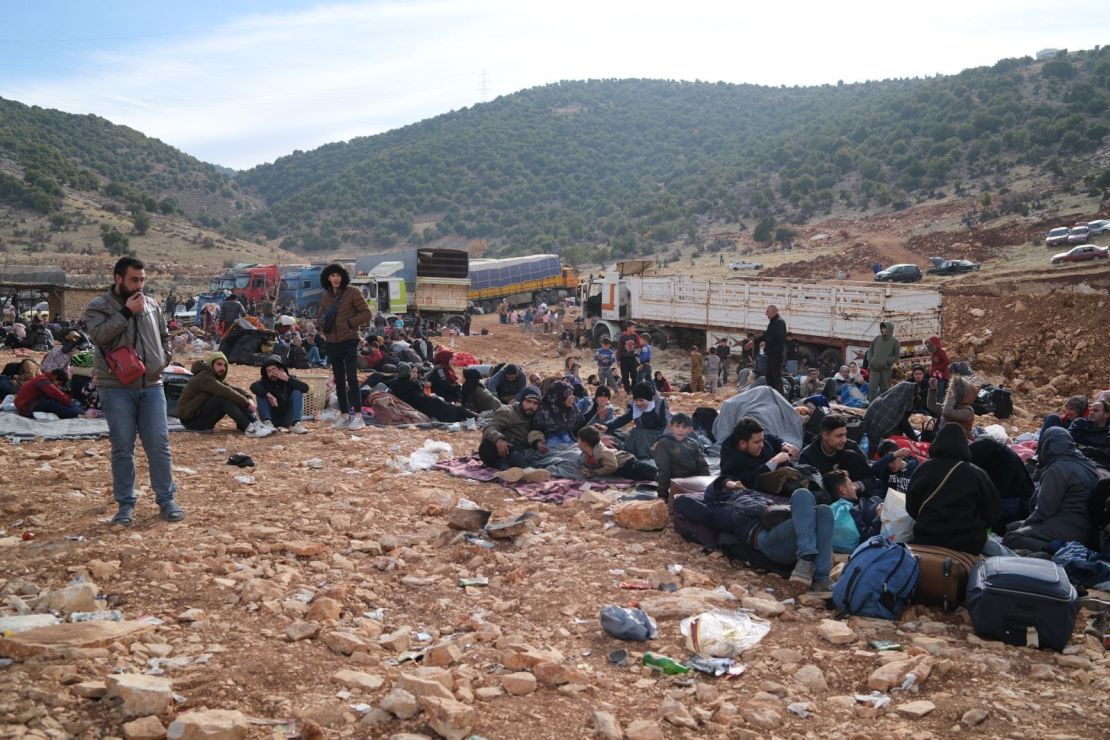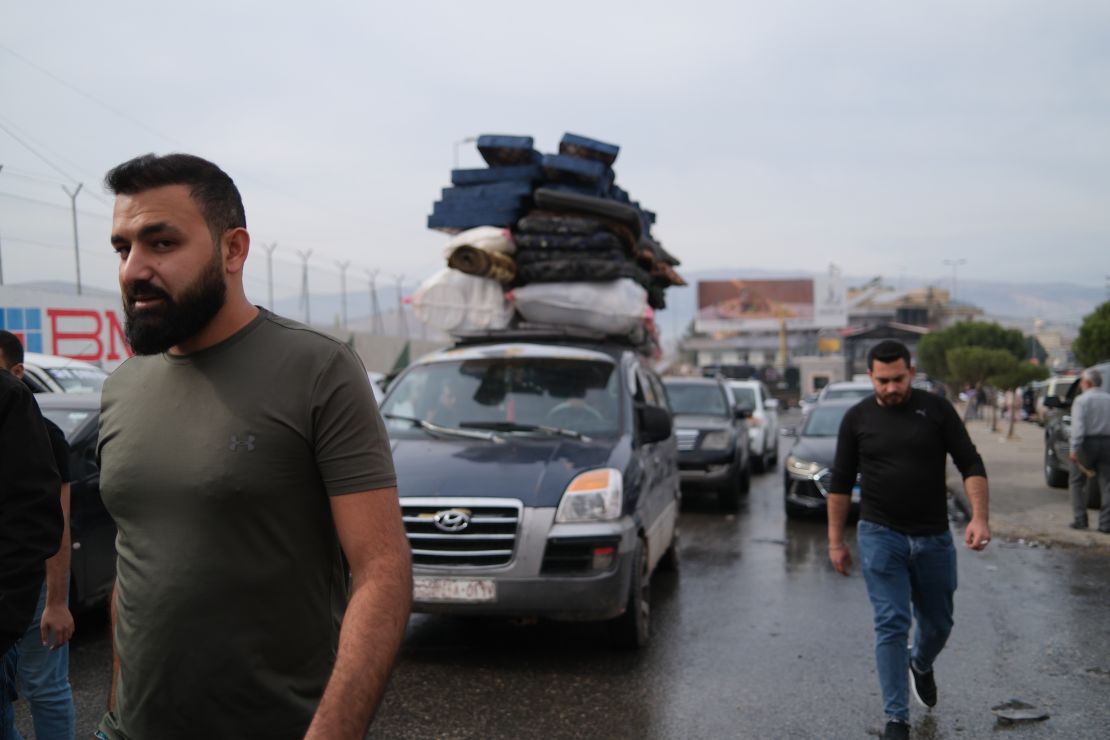CNN — Nadia’s eyes were full of tears as she crossed the border from Syria to Lebanon. She was finally going to see her son. A 14-year-old boy the last time she saw him; he is now 22 and living in Germany.
Her son left the family home in Hasaka in northern Syria in 2013 during one of the many escalations of the war which had at that point been raging for more than two years. Nadia, her husband Saiman and their daughter Sydra stayed in Syria, never imagining it would be so long before they’d see Mohammed again.
With a couple of suitcases in tow, Nadia and Saiman finally made it to Masnaa on the Lebanese side of the border on Wednesday afternoon. They were headed to Beirut to board a flight to Germany.
The fall of Syria’s longtime dictator Bashar al-Assad over the weekend triggered a wave of jubilant celebrations, with many Syrians rushing home after years in exile. But the astonishing speed with which the rebels took over the country and the subsequent Israeli attacks against Syrian government targets also sparked worries about what’s next for the battered country.
At the crossing in Masnaa, hundreds of people were streaming in both directions, a sense of nervousness and chaos in the air.
Beeping vehicles were trying to weave their way through the traffic jam of cars and vans loaded to the roof with people and their possessions. Taxi drivers flocked to the crossing, offering rides to those on foot – some asking for extortionate amounts of money for a transfer to Beirut or Damascus.
People cross from Syria into Lebanon at the Masnaa border crossing on Wednesday, December 11.Ivana Kottasova/CNN
Another couple, Mohammed and his wife, were among those returning to Syria. Waiting for their documents to be stamped at the Lebanese side of the border, they were all smiles. They had first met in Lebanon after both fled the war in Syria. Now, after 11 years abroad, they were taking their family home.
“My sons were all born here, in Lebanon, this is their first time going to Syria,” Mohammed said, pointing at four little boys sitting next to each other inside the busy border building. Their feet dangling from the bench, the children looked excited about the prospect of returning to a home they had never known.
“It’s been very long time, and I just want to go home, back to my village. My brother is there, I have not seen him in 11 years,” Mohammed told CNN.
But returning home proved far more difficult than he thought. Officials told him that while he and his wife were fine to go, his children didn’t have the correct paperwork to cross the border – because they were born in Lebanon, not Syria.
Suddenly, the smiles were all gone. As the family walked out of the building, a stranger came up offering to take them across the border on foot – for a hefty fee. Mohammed turned him away.
Paperwork headaches have been a problem for many Syrians wanting to come home. Many had left the country under precarious conditions, often illegally.
‘I just want to keep my children safe’
Diaa and his family were heading the opposite way – from Syria back to Lebanon.
He is from Lebanon, while his wife Amani is from Syria. The couple and their three children lived in Beirut, but fled to Damascus in September, when Israel launched an intense bombing campaign against Hezbollah in Lebanon.
“I decided to send my family to Syria after Hassan Nasrallah was assassinated. The children were playing outside and I found them in a horrific state, they were completely consumed by fear,” he said.
Nasrallah, the long-time leader of the Iran-backed Hezbollah, was killed when Israeli jets hit the militant group’s headquarters in southern Beirut. The huge strike and subsequent explosions rocked the city, including the neighborhood where Diaa’s family lived.
“My eldest daughter could not speak for an hour. It really terrified me. The children have not yet recovered from the (2020) Beirut port explosion; they are afraid of everything, they are very afraid even of the wind slamming the door,” he said.
On Wednesday, Diaa and Amani found themselves once again running away from strikes. They were hauling a huge pile of bags from the border to a car parked on the Lebanese side, all five family members carrying what they could.
Amani, her husband Diaa and their children decided to return to Beirut on Wednesday.Ivana Kottasova/CNN
Diaa said they were moving because he was worried about Israel’s strikes against Syria.Ivana Kottasova/CNN
Israel has said it struck Syria nearly 500 times in the past two days, destroying the country’s weapons stockpiles and naval fleet to prevent them falling “into the hands of extremists.” Meanwhile, Turkish state media reported a Turkish drone destroyed military equipment in northern Syria that had been seized by a Kurdish group.
“The thing that struck me the most was when my little son, who is seven years old, told me on the phone that he wanted to move to Beirut three days ago. The idea of displacement is now deeply rooted in his mind,” he said.
“Lebanon, war. Syria, war,” Diaa said, pointing across the border and back. “I just want to keep my children safe,” he said.
While most people in Syria are celebrating the collapse of the Assad regime, many are worried about the future.
The Islamist rebel coalition that has now taken over Syria brings together a variety of armed rebel groups, each with its own ideology and ideas about what should happen next. That leaves Syria’s minority groups like Alawites, Shia Muslims, Ismailis, Druze, Kurds and Christians in fear of being targeted.
Concerns over the precarious security situation and the potential for retribution has led some supporters of the Assad regime to flee the country. Many of the ousted regime’s senior figures come from the Alawite sect, a branch of Shia Islam.
Just beyond the Masnaa border crossing, in the no man’s land between the two countries, thousands of people were waiting on Thursday to get permits to enter Lebanon. Many had been there for days, sleeping on the ground in the open air. “It gets so cold at night here. And there are so many children,” Fatima, a young woman trying to get into Lebanon, told CNN.
In a strip of rugged terrain on the Syria-Lebanon border between the two checkpoints, thousands of people were waiting on Thursday, December 12, to get permits to enter Lebanon.Ivana Kottasova/CNN
She said she and her family fled Damascus after armed rebels entered their home three days ago, ordering them to leave. “We are Shia and they said we have to go or they’ll kill us. All Shia will have to leave Syria now,” she said.
Fatima said she and her family and friends were celebrating the fall of Assad. “We hate him. He’s a criminal, he killed a lot of people. We hate him, we hate him. But you know, there’s a lot of people who hate us too.”
The Lebanese General Security intelligence agency said that some people without permits were trying to enter Lebanon by force at the Masnaa crossing and that the Lebanese army and security agencies had now been deployed there to take control of the situation.
Saiman and Nadia, the couple traveling to Germany to meet their son, said the uncertainty and fear of more violence were among the reasons why they had decided to leave now. As Kurds from northern Syria, they are worried about another escalation in the long-running conflict between Kurdish insurgents and Turkey-backed militant groups.
“Even the areas where there are no problems, we are always worried there would be problems. There are all sorts of (armed men who) came from all over the world to Syria to join al Qaeda. As Kurds, we are especially afraid,” Saiman told CNN.
The journey across the border was a bittersweet moment for the couple. Weeping, Nadia explained that they were forced to leave behind their daughter Sydra, who is now 18. She has not yet received her travel permits and is staying with the neighbors for the time being.
As Nadia and Saiman continued their journey to Beirut, Mohammed, his wife and their four sons headed the other way.
They made it to Syria on Wednesday evening.
“Thank God, we have arrived,” Mohammed told CNN in a text message. “They welcomed us and my children with great hospitality and honor. I did not find my house though. It was destroyed by a plane (strike),” he said.
CNN’s Sarah El Sirgany contributed to this report.
CNN









